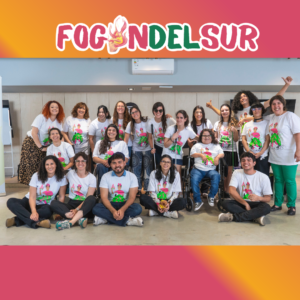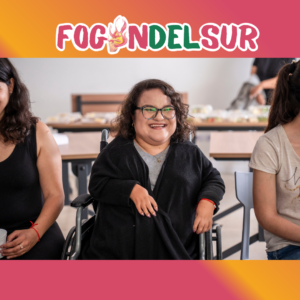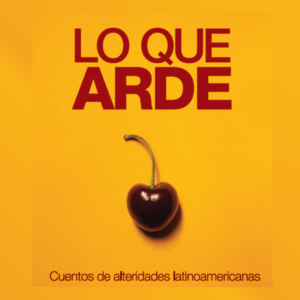Persons with disabilities are discouraged from obtaining information and services on sexual and reproductive health and rights (SRHR), and research indicates that several factors play a role.[1] Taking our role as leaders very seriously, and supported by iiDi, we spoke about these factors in testimonials featured in a video at the Nairobi Summit on ICPD25.Coming from different countries, our testimonials highlighted some of the challenges youth face and posed solutions for how we can work together to improve the status of SRHR for young people with disabilities.
Recognize the Rights of Young People With Disabilities!
 Studies show that young persons with disabilities, especially young women and girls, are often believed by others to be nonsexual.[2] This contributes to the lack of access to information on SRHR that people with disabilities often suffer. [3] However, as Germán (META Uruguay) said, “All young people with disabilities have rights, including the right to have a full and satisfying sexual life and to have children.”
Studies show that young persons with disabilities, especially young women and girls, are often believed by others to be nonsexual.[2] This contributes to the lack of access to information on SRHR that people with disabilities often suffer. [3] However, as Germán (META Uruguay) said, “All young people with disabilities have rights, including the right to have a full and satisfying sexual life and to have children.”
Sofi Savoy (META Argentina) noted that the materials provided in comprehensive sexuality education workshops often aren’t accessible to people with disabilities—brochures lack large print or Braille and videos don’t have audio descriptions, sign language, or subtitles. “So, logically, we people with disabilities are left excluded from receiving all this information that is crucial.”
Educate Health Professionals to Break Down Barriers
 Service providers’ ignorance about disability can also be a barrier to young persons with disabilities receiving comprehensive SRH information and services.[4] Sofi also said, “Professionals working in the area of sexuality are very poorly prepared about how to react, how to work when a person with disabilities comes asking about this subject.” Nati Farías (META Uruguay) stressed the importance of working with health professionals and educators so they understand “the diverse realities of persons with disabilities: what they want, what they need, what they feel. Because many times there are assumptions that are far from true.”
Service providers’ ignorance about disability can also be a barrier to young persons with disabilities receiving comprehensive SRH information and services.[4] Sofi also said, “Professionals working in the area of sexuality are very poorly prepared about how to react, how to work when a person with disabilities comes asking about this subject.” Nati Farías (META Uruguay) stressed the importance of working with health professionals and educators so they understand “the diverse realities of persons with disabilities: what they want, what they need, what they feel. Because many times there are assumptions that are far from true.”
International standards like the Convention on the Rights of Persons with Disabilities and the International Conference on Population Development Programme of Action establish norms that need to be implemented through policies and practices to uphold equality for young persons with disabilities. But to fulfil these rights, young persons with disabilities must be included from start to finish as full participants in the design and implementation of programs and policies that affect their lives. Nothing about us, without us!
Work With Us on Policies That Affect Us
Young people with disabilities should be elevated to leadership roles where we can propose, plan, implement, and report on projects as equal partners, said Hailey (United States). The video that includes our testimonials was screened at the Nairobi Summit as a resource to outline necessary policy changes and investments for women and young persons with disabilities to fully realize their SRHR and live free from gender-based violence.
The Path to Equality for Women and Young Persons With Disabilities: Realizing Sexual and Reproductive Health and Rights and Ending Gender-Based Violence is a 14-minute presentation accompanied by a guide designed to help users make the most of the presentation. We expect to push for translation of this resource into Spanish in the near future, so we can use it and spread it as part of our advocacy for our own rights
As we say, “No action, no rights!” Building a more inclusive society starts with each of us.As we prepare for the International Day of Persons with Disabilities on December 3, we must partner together to take concrete steps to ensure the SRHR of people with disabilities are fully realized, no matter where in the world they live.
[1] Wisdom Kwadwo Mprah, “Perceptions About Barriers to Sexual and Reproductive Health Information and Services Among Deaf People in Ghana,” Disability, CBR, and Inclusive Development Journal 24, no. 3 (2013): 23-36.
[2] Martin G. Brodwin and Pauline Cheryl Frederick, “Sexuality and Societal Beliefs Regarding Persons Living With Disabilities,” Journal of Rehabilitation 76, no. 4 (2010): 37-41.
[3] Advocates for Youth, “Sexual Health Education for Young People with Disabilities–Research and Resources for Educators” (2017), http://www.advocatesforyouth.org/publications/publicationsa-z/2559.
[4] Wisdom Kwadwo Mprah, “Perceptions About Barriers to Sexual and Reproductive Health Information and Services Among Deaf People in Ghana.”



